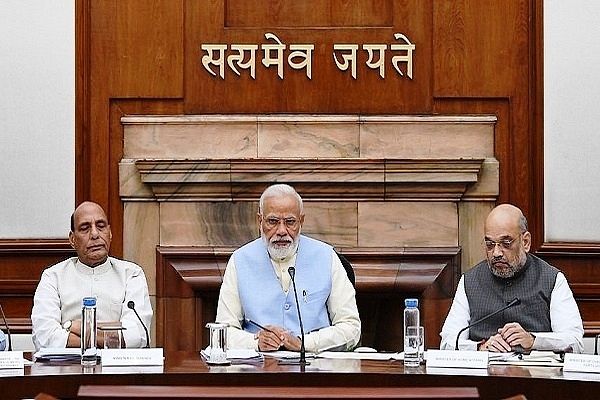
Big Push To Make In India: After Resounding Success Of PLI Scheme For Mobile Production, Govt Extends Scheme To 10 More Sectors
To give an impetus to the manufacturing sector, the Union Cabinet on Wednesday approved a mega production linked incentive (PLI) scheme for 10 sectors.
The total outlay has been pegged at Rs 1,45,980 crore. Announcing the decision, Union Finance Minister Nirmala Sitharaman said that the scheme would entail an expenditure of about Rs 2 lakh crore.
Accordingly, the scheme is expected to attract foreign players, boost production and generate employment in the country.
The sector covered under the scheme include Electronics and Technology products, automobile and auto components, pharmaceuticals drugs, telecom and networking products, textile products, food products, high efficiency Solar PV modules and speciality steel among others.
Notably, this is in addition to the similar scheme for the electronics manufacturing sector announced by Centre earlier particularly for mobile phone manufacturing, to curb increasing imports.
Production linked scheme are schemes wherein cash incentives will be given to companies setting up manufacturing in India based on the output produced by them.
The 10 sectors along with financial incentives allotted to them are mentioned below:
The PLI scheme across these 10 key specific sectors will make Indian manufacturers globally competitive, attract investment in the areas of core competency and cutting-edge technology; ensure efficiencies; create economies of scale; enhance exports and make India an integral part of the global supply chain, the official release said.
The Cabinet release also specified the reasons behind the selection of these 10 sectors:
- ACC battery manufacturing represents one of the largest economic opportunities of the twenty-first century for several global growth sectors, such as consumer electronics, electric vehicles, and renewable energy. The PLI scheme for ACC battery will incentivize large domestic and international players in establishing a competitive ACC battery set-up in the country.
- India is expected to have a USD 1 trillion digital economy by 2025. Additionally, the Government's push for data localization, Internet of Things market in India, projects such as Smart City and Digital India are expected to increase the demand for electronic products. The PLI scheme will boost the production of electronic products in India.
- The automotive industry is a major economic contributor in India. The PLI scheme will make the Indian automotive Industry more competitive and will enhance globalization of the Indian automotive sector.
- The Indian pharmaceutical industry is the third largest in the world by volume and 14th largest in terms of value. It contributes 3.5% of the total drugs and medicines exported globally. India possesses the complete ecosystem for development and manufacturing of pharmaceuticals and a robust ecosystem of allied industries. The PLI scheme will incentivize the global and domestic players to engage in high value production.
- Telecom equipment forms a critical and strategic element of building a secured telecom infrastructure and India aspires to become a major original equipment manufacturer of telecom and networking products. The PLI scheme is expected to attract large investments from global players and help domestic companies seize the emerging opportunities and become big players in the export market.
- The Indian textile industry is one of the largest in the world and has a share of ~5% of global exports in textiles and apparel. But India's share in the manmade fibre (MMF) segment is low in contrast to the global consumptionpattern, which is majorly in this segment. The PLI scheme will attract large investment in the sector to further boost domestic manufacturing, especially in the MMF segment and technical textiles.
- The growth of the processed food industry leads to better price for farmers and reduces high levels of wastage. Specific product lines having high growth potential and capabilities to generate medium- to large-scale employment have been identified for providing support through PLI scheme.
- Large imports of solar PV panels pose risks in supply-chain resilience and have strategic security challenges considering the electronic (hackable) nature of the value chain. A focused PLI scheme for solar PV modules will incentivize domestic and global players to build large-scale solar PV capacity in India and help India leapfrog in capturing the global value chains for solar PV manufacturing.
- White goods (air conditioners and LEDs) have very high potential of domestic value addition and making these products globally competitive. A PLI scheme for the sector will lead to more domestic manufacturing, generation of jobs and increased exports.
- Steel is a strategically important industry and India is the world's second largest steel producer in the world. It is a net exporter of finished steel and has the potential to become a champion in certain grades of steel. A PLI scheme in Specialty Steel will help in enhancing manufacturing capabilities for value added steel leading to increase in total exports.
The above will be in addition to the already notified PLI schemes in the following sectors:
The statement stated, “The Prime Minister's clarion call for an 'AatmaNirbhar Bharat' envisages policies for the promotion of an efficient, equitable and resilient manufacturing sector in the country.”
“Promotion of the manufacturing sector and creation of a conducive manufacturing ecosystem will not only enable integration with global supply chains but also establish backward linkages with the MSME sector in the country. It will lead to overall growth in the economy and create huge employment opportunities,” the statement added.
President of CII, Uday Kotak welcomed the PLI scheme calling it transformational, timely and strategically targeted policy that will help India to become global manufacturing hub.